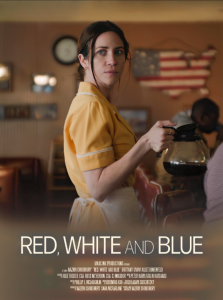Writer and Director Nazrin Choudhury talks about her directorial debut ‘Red, White and Blue’, which is a finalist at this year’s Academy Awards

Shortlisted from a total of 187 short films, Red, White and Blue has made its mark, making it as a finalist in the ‘Live Action Short Film’ category at this year’s Academy Awards, to take place on Sunday 10th March at the Dolby Theatre at Ovation Hollywood. The film exploring Rachel’s story – a moving reality of a single parent in a precarious position forced to cross state lines in search of a necessary abortion. As we learn more about Rachel and the series of events that led to this journey, we learn a heartbreaking truth which means her life will never be the same again. Ahead of this year’s awards, Nazrin tells us more about exploring this sensitive subject further, working with fellow producer Sara McFarlane, cinematographer Adam Suschitzky and the cast consisting of Brittany Snow, Juliet Donenfeld, Redding Munsell, Jud Tylor, Ashley A. Williams, Sloan Muldown, Taryn Leggett, Neil Napier, Peter Breitmayer, Adam Lee and Mo Collins and what she’s learned from creating the film.
Hi Nazrin, your film Red, White and Blue has been nominated for this year’s Academy Award ‘Live Action Short Film’ category. How are you feeling?
Our whole cast and crew is feeling great about our nomination for the simple fact that it means more attention will be brought to the film and the very important reason why we chose to tell it i.e. to reignite the conversation around bodily autonomy and protecting reproductive rights. I think it’s additionally wonderful for me to have their hard work validated in this way.
Red, White and Blue tells the moving story of Rachel, a single parent in a precarious position forced to cross state lines in search of a necessary abortion. As we learn more about Rachel and the series of events that led to this journey, we learn a heartbreaking truth which means her life will never be the same again. What inspired you to explore this narrative further?
Nothing is ever what it seems and we should never be so quick to judge other people for the predicament they find themselves in; a predicament made much worse by the Supreme Court’s 2022 decision that effectively overturned Roe v Wade. I set out to tell this story in the most characterful way possible for all the people affected who could not tell their story for themselves.
You’ve written and directed the film – marking your directorial debut. It is produced by yourself and Sara McFarlane with cinematography by Adam Suschitzky and stars Brittany Snow, Juliet Donenfeld, Redding Munsell, Jud Tylor, Ashley A. Williams, Sloan Muldown, Taryn Leggett, Neil Napier, Peter Breitmayer, Adam Lee and Mo Collins amongst a larger team of creatives. How have you all worked together to realise the film?
Our film has succeeded on the basis that so many of the people you mentioned joined us with a purity of mind and spirit that was about championing my vision and serving the film’s needs above all else. They all understand the importance of why we needed to tell this story and were committed and dedicated to realizing this alongside me. While this film has had its challenges, it has also had many guardian angels that have come to our rescue when we needed it.
The film is the recipient of the Grand Jury Award for Best Live Action Short at Edmonton International Film Festival. How does it feel to have been acknowledged for your work in this way?
Edmonton International Film Festival will always be dear to my heart as the first festival to screen us. The Grand Jury Award for Best Live Action Short paved the way for our Oscars journey. I attended the festival in person and I can attest to the fact that their hearts are indeed big as Sydney Moule (Executive Director) often states. She, Vincent Brulotte and the whole team welcomed me so warmly and have become part of my film family.
What have you learned/taken away from creating the film?
If you believe a story enough, you will find a way to tell it against all the odds.
What can viewers expect from the film?
I think viewers can expect to make up their own minds about how the story lands on them but I would simply ask them to pay attention to every little detail – even if it’s on the second or third watch – because there is a story reason or point to everything we show on the screen.
What would you like for viewers to take away from the film?
I am loathe to tell anyone what to think or do; the point of this film is not to be preachy or didactic. However, I hope it starts up a conversation within ourselves and for us to all challenge our own preconceived notions and belief systems in such a way that allows us to see others in need and to whom we owe compassion.
Questions by Lucy Basaba.
To find out more about Red, White and Blue, visit here…


Leave a Comment